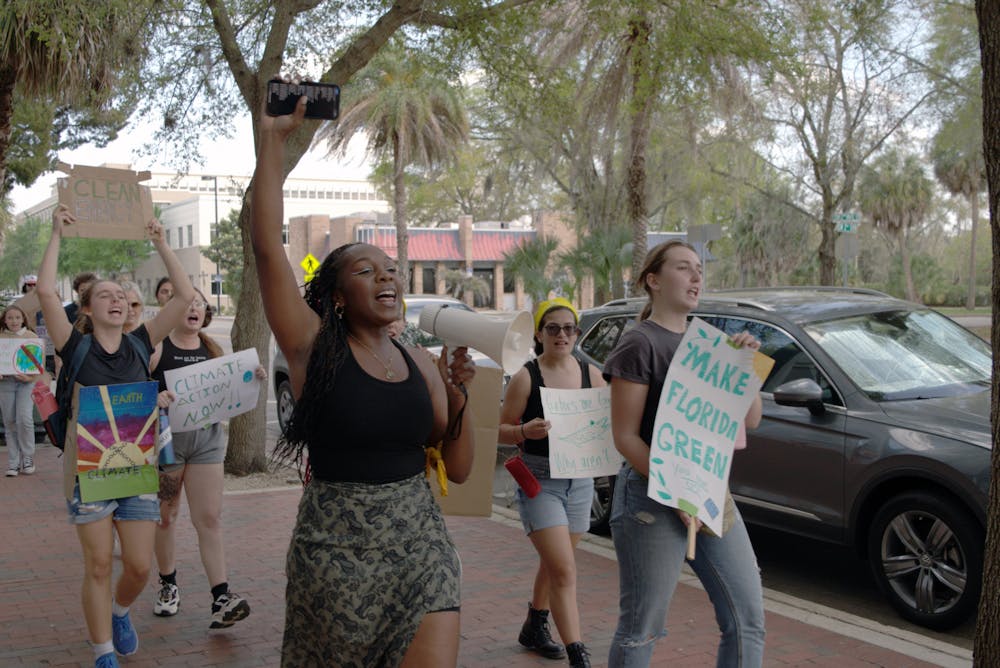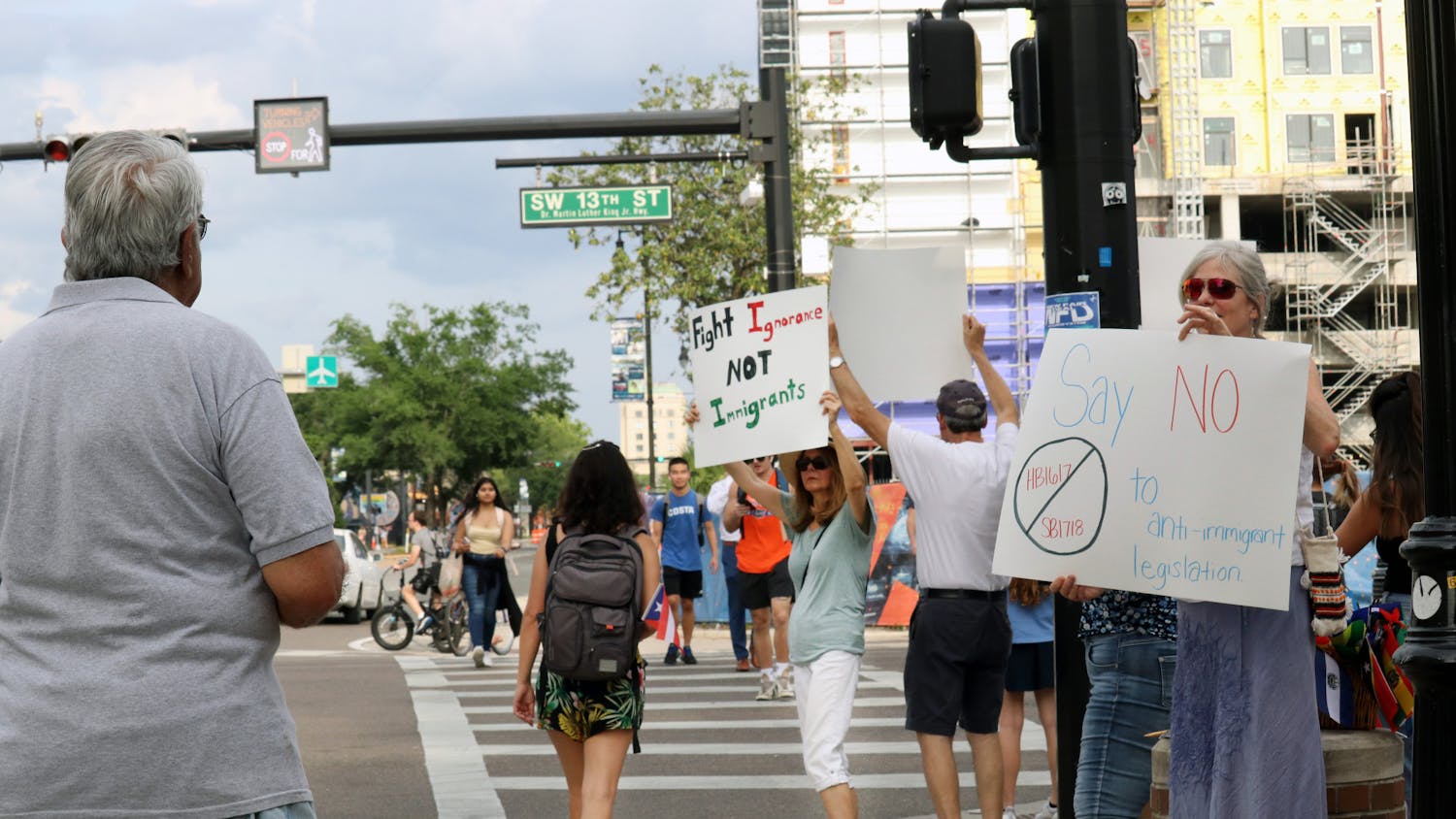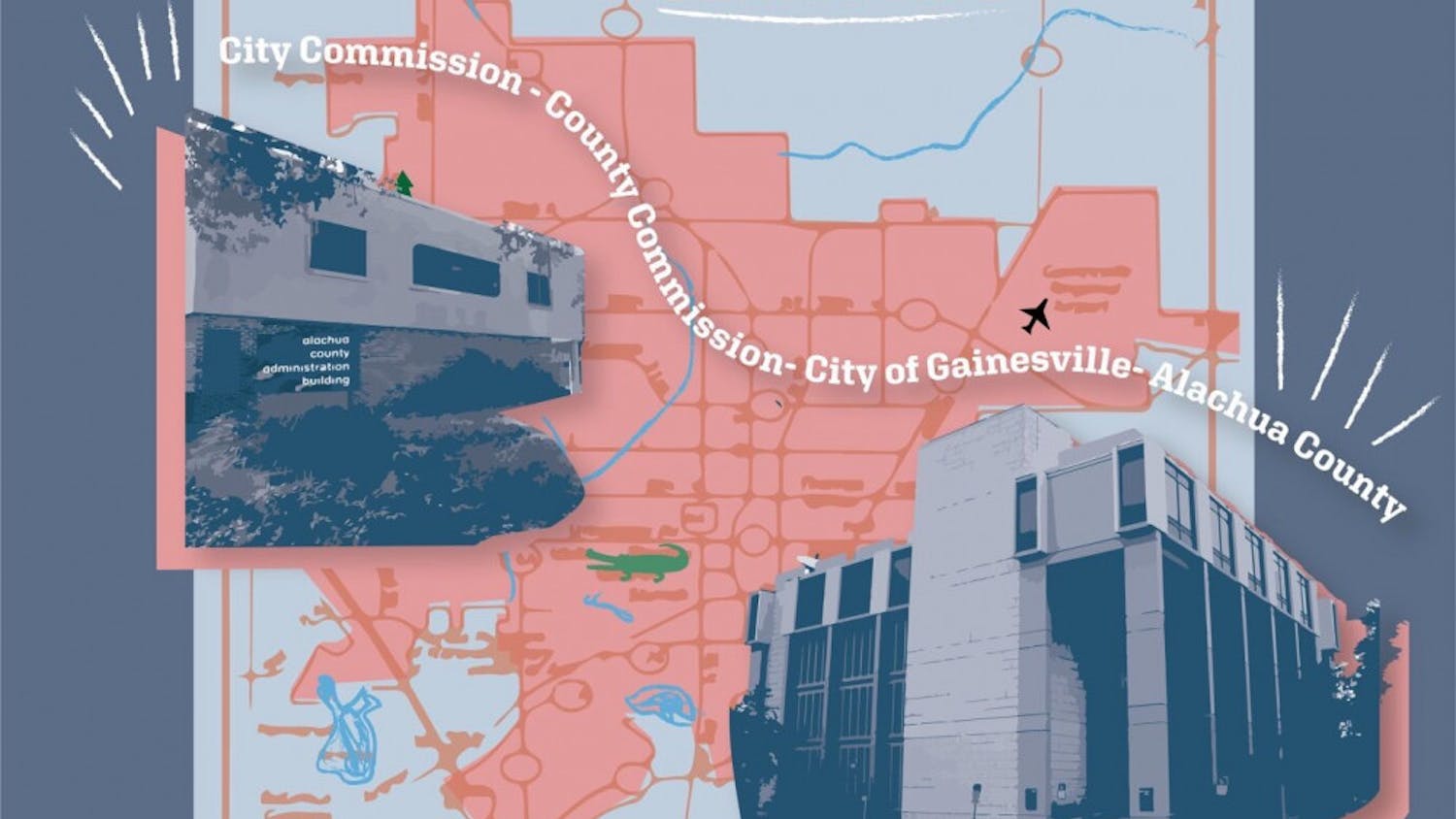With its abundance of historic natural resources, Alachua County is no stranger to climate and environmental activism.
From petitions to protests, residents and students advocated and fought for decades. For “Where We Stand,” The Alligator looked through decades worth of its archives to chronicle some highlights of the county’s environmental activism.
1946: Gainesville residents call for removal of wastewater sewage in Lake Alice
In 1925, Lake Alice became UF’s wildlife sanctuary. The university originally had intentions to preserve the area, until two decades later. In 1946, UF built a wastewater treatment plan that rerouted sewage into the lake. Outraged, Gainesville residents demanded the university reverse its decision.
UF redirected the sewage to a nearby sinkhole the following year.
1971: UF students bike over 150 miles from Gainesville to Tallahassee to protest proposed highway
In 1971, a group of 85 UF students biked from Gainesville to Tallahassee to protest the state’s proposed Cross-Campus Highway, also known as Lake Alice Loop Road. Two years prior, former UF President Stephen O’Connell announced the highway’s plan to drain Lake Alice, which ensued years of public outcry.
After the trip, the state and university administrations agreed to hold a public hearing at the Reitz Union, even though the highway was already approved by the state.
1972: Lake Alice advocates petition against proposed highway
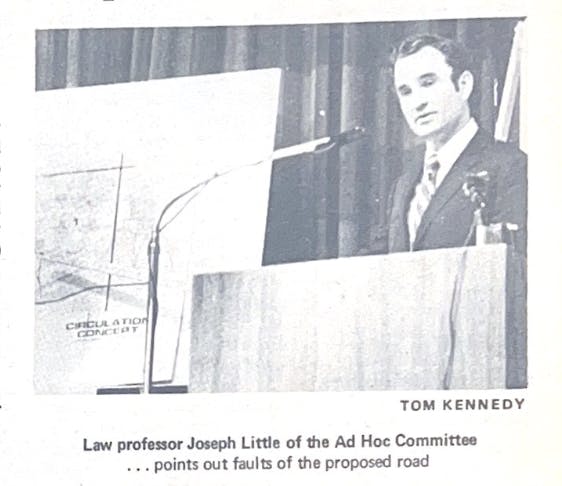
Over 300 Gainesville residents and UF students and faculty attended the public hearing for the proposed Cross-Campus Highway at the Reitz Union in January 1972. Hundreds more also waited outside the Reitz.
UF defended the road plan to attendees after advocates spoke out. UF law professor Joseph Little presented a 260-foot petition with 4,397 signatures against construction of the road.
The following week, the university agreed to look into alternate options, effectively killing the highway plan.
1978: Gainesville Sierra Club protests power plant
The Gainesville chapter of the Sierra Club, a national conservation group, protested Gainesville Regional Utilities’ power plant Deerhaven II. Activists claimed the coal-burning plant would attack the community’s air and water.
1987 to 1998: Gainesville residents and “Alice’s Friends” fight to preserve Lake Alice
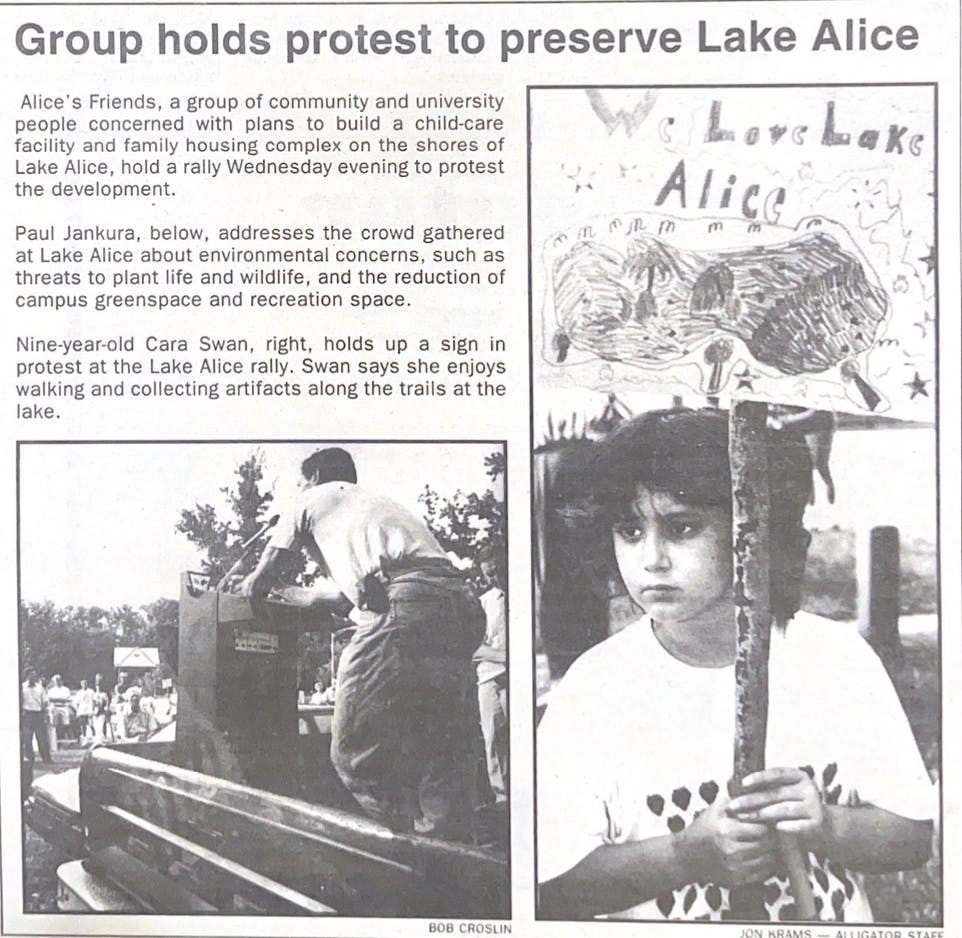
In August 1987, it became publicly known the UF administration had proposed to build 176 housing units and parking lots on the Bat House field that would destroy the land and impact Lake Alice. This proposed plan incited over a decade of protests from Gainesville residents, UF students and faculty.
In June 1994, “Alice’s Friends” was formed and became the main organization leading the movement.
Thousands of Gainesville residents as young as 6 years old signed petitions, held protests and wrote thousands of letters to Florida legislators to stop the proposed construction.
Valerie True, the 1998 UF Environmental Action Group president, was one of several leaders of the decade-long movement.
“It wasn't just the environmental impact, it was also the cultural impact on the community of people who get engaged there and who took their kids there,” True said. “It was also a
cultural touchstone.”
True worked with several environmental groups on campus that organized different movements and appreciated the support from the campus community, she said.
“I respect that the college did a nice job of allowing us that space and figuring out
how to get through some of the rules when we wanted to do different actions,” True said.
After several years of Gainesville students and residents protesting, former Gov. Lawton Chiles moved to preserve the Lake Alice area; the motion passed unanimously.
“[It] was really impactful and empowering for all of us to feel like we could create that change,” True said. “To be involved with it and have something that was tangible in our backyard that we were able to do.”
2008: Gainesville, UF community hold global warming awareness events
Gainesville and UF held an all-day event based on Focus the Nation, a national initiative to create climate change solutions, in January 2008.
The event kicked off with Focus The Gator Nation Teach-In that included climate change presentations from UF students and professors.
Former Gainesville Mayor Peegan Hanrahan held a presentation about the role leaders have in sustainability.
Hanrahan highlighted Gainesville’s efforts to reduce carbon emissions in her presentation.
"What is really happening on the ground in America's cities and counties?" Hanrahan said at the time. "The answer is: quite a bit. Certainly, Gainesville and Alachua County have been active."
2009: UF Vegetarians protest climate change
A UF vegetarian students group, enVeg, associated climate change with meat consumption and protested it by writing messages outside of Library West in 2009.
"Animal agriculture = climate change" was one of the few messages written in chalk on the sidewalks outside the library. The group encouraged students to consume less meat to help eliminate the effects of climate change.
2010: UF students campaign for campus “Meatless Mondays”
In 2010, thousands of UF students rallied to encourage the university to participate in national Meatless Mondays and remove meat from all dining halls every Monday. The movement was created in response to concerns of climate change and animal cruelty. An online petition and protest in partnership with peta2, PETA’s youth division, garnered support from thousands of students.
The following year, UF implemented Meat-Free Mondays, a program offering vegetarian options every Monday, in response to the movement. Eddie Garza, the New York campaign coordinator of Mercy for Animals at the time, wrote an op-ed in The Alligator in 2011 commending UF’s decision.
“UF has taken a big step in the right direction by offering vegetarian meals in honor of Meat-Free Mondays,” Garza wrote. “We encourage the university to take it just a step further by going completely meat-free on Mondays.”
2015: UF group hosts “Global Divestment Day” rally
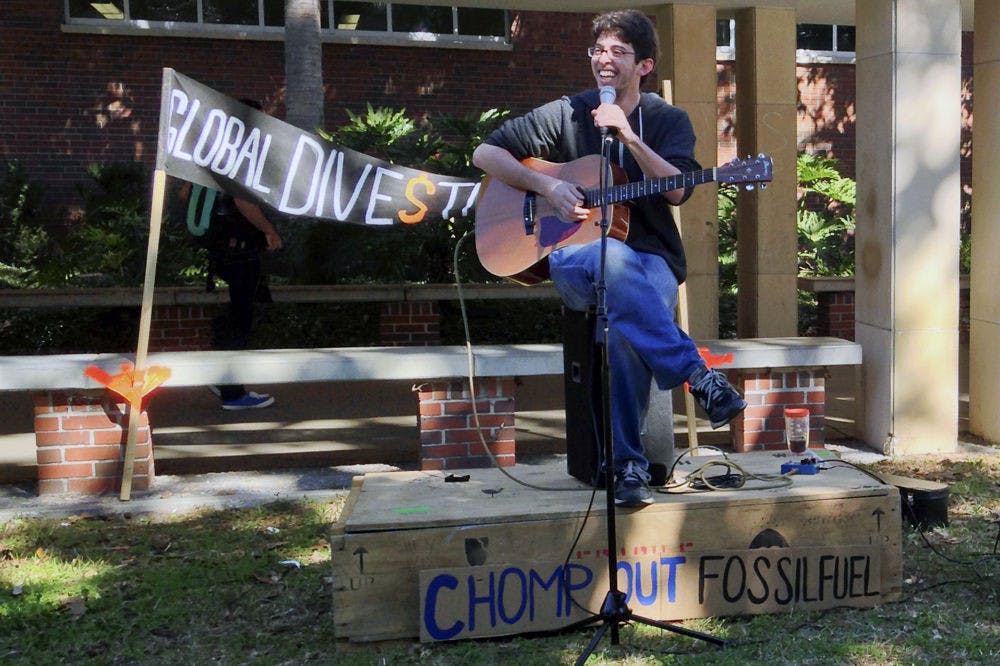
UF Intellectual Decisions on Environmental Awareness Solutions club held the university’s first “Global Divestment Day” rally Feb. 2015. About 60 gathered on campus to listen to guest speakers, a musical performance and to protest the national investment of fossil fuels.
Protestors chanted and held signs that said statements like “4 degrees warmer = millions under water.”
2017: Gainesville residents “March for Science” on Earth Day
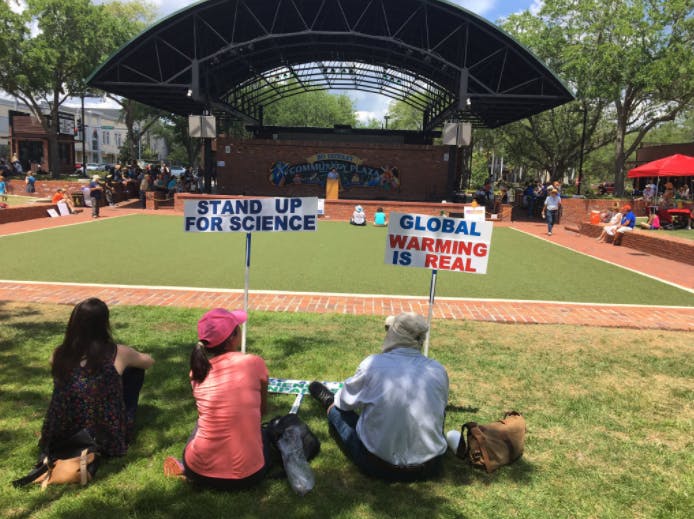
About 1,000 Gainesville residents marched and protested to show support for science after the election of former President Donald Trump on Earth Day 2017.
Protestors carried signs saying “Make America Smart Again” and “Global Warming Is Real.”
The goals of the march were to connect the community with science and hold lawmakers accountable.
“We need to actually start seeing our ideas represented as opposed to private agendas being pushed,” Juan Zapata, one of the March for Science Gainesville organizers, told The Alligator at the time.
2019: UF Students create #SaveStrawsMidtown movement
Six UF students created a petition and @ufstraws Instagram account to call for a plastic straw ban implementation at Midtown.
Later, the Gainesville City Commission implemented the city-wide plastic straw ban at the beginning of 2020.
2019: Climate Action Gator holds “Youth Climate Strike”
Climate Action Gator, a UF student group, organized a “Youth Climate Strike” outside of Tigert Hall and Gainesville City Hall to demand UF and the city to change their climate policies in December 2019.
Climate Action Gator formed in 2019 and this was the second climate strike the group organized in its founding semester.
2019: Alachua County residents protest Nestlé’s springs permit

Protestors march through downtown High Springs Friday to oppose a permit that would allow Nestlé Waters North America to use 1.152 million gallons of water from Ginnie Springs per day for bottled water. Activists spoke about the environmental importance of the springs and sang songs, then marched around the downtown block.
On Nov. 1, 2019, about 100 protestors gathered in High Springs to protest a permit that would allow Nestlé Waters North America to bottle 1.152 million gallons of water from Ginnie Springs a day.
The protest was organized by local environmental groups such as Our Santa Fe River and Climate Action Gator.
Merrillee Malwitz-Jipson, one of the movement’s organizers, helped found Our Santa Fe River to protect the river and springs with several movements over the years. The permit in 2019 was nothing new to Malwitz-Jipson, as permits to bottle the springs’ water were introduced in prior years.
“We told all the local people, ‘Listen, when that thing comes back up again, we'll be here for you,’ and in 2019 it did,” Malwitz-Jipson said.
Despite protests, the Suwannee River Water Management District Board approved the plan February 2021.
Malwitz-Jipson was disappointed that the company and board blatantly disregarded the public’s opinions but doesn’t plan to stop advocating for the river and springs, she said.
The fight to preserve the springs is far from over. Shortly after the board’s decision, Our Santa Fe River and Florida Defenders of the Environment filed a lawsuit challenging the board’s decision.
2021: The “Save McCarty Woods” movement
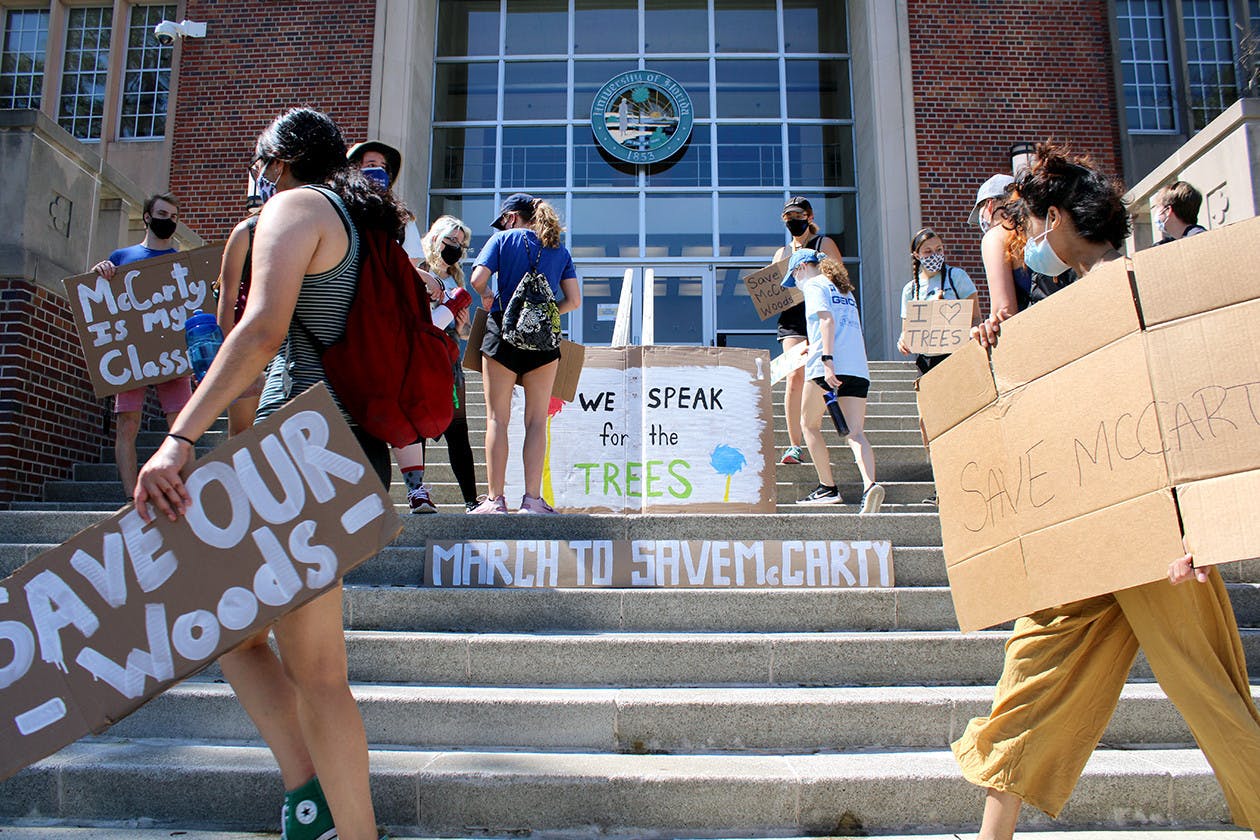
At the beginning of 2021, the “Save McCarty Woods” movement was born after UF announced it planned to use the McCarty Woods conservation area as a construction site.
UF students and faculty protested against UF’s decision for months. Leaders of the movement held marches, created social media accounts and a petition that garnered over 14,600 signatures.
Vasilios Kosmakos, a 23-year-old UF alumnus, was one of the three founders of the 2021 movement. He became involved because he knew how much McCarty Woods provided to the campus community.
“The McCarty Woods is home to over 1,000 different species or plants, animals, fungi, insects, reptiles,” Kosmakos said.
Kosmakos was a part of a lesser-known movement that occurred after the protests that worked to revitalize the woods by cleaning up, and planting trees and plants, he said.
Similar issues happened decades ago with preserving Lake Alice, that’s why we have to consistently keep an eye out, Kosmakos said.
“That’s why keeping up with these efforts long-term is so important,” Kosmakos said.
After months of protest, UF backed off from considering the area for development. The university didn’t explain why it made this decision or if it was a result of the protests.
2022: Global Climate Strike protest at UF
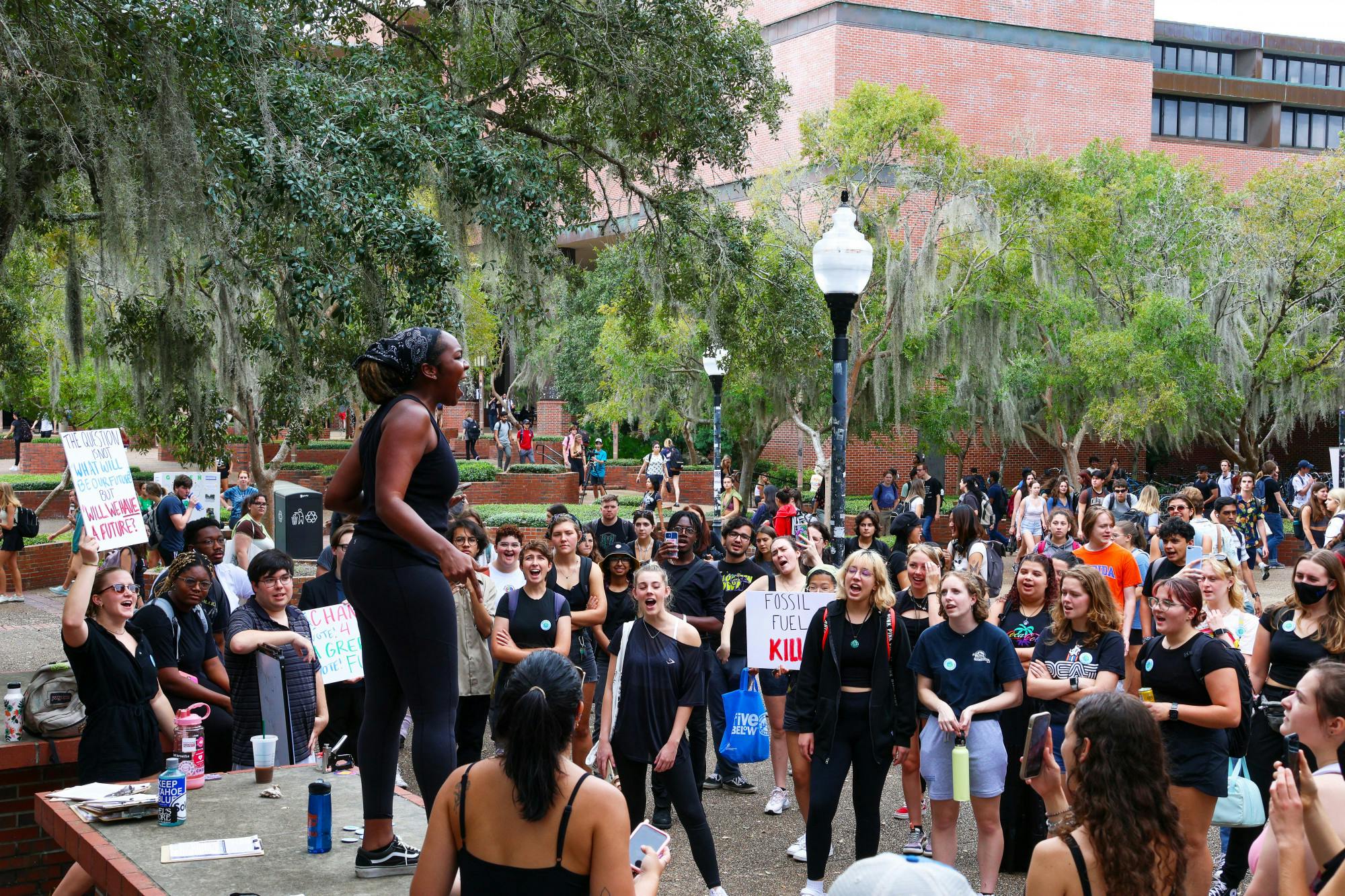
About 30 protestors wearing black to mourn the Earth gathered in Turlington Plaza for a climate strike Sept. 23. The protest was organized by several campus groups like Climate Action Gator, Sunrise Movement Gainesville and Take Action Florida.
Climate Action Gator officers Campbell Al-Khafaji, an 18-year-old UF sustainability studies freshman, and Samantha Snyder, a 22-year-old UF information systems graduate student, encouraged students of all majors and backgrounds to join the movement to conserve the environment.
“It’s good to get together with like-minded individuals and try to spread that hope and passion and sometimes necessary anger to get people going,” Al-Khafaji said.
The two recognize that advocating for sustainability and conservation can feel daunting and upsetting at times, they said.
“A lot of college students, and I don’t blame them, start to filter out that information because they don’t have the capacity to emotionally take that on,” Snyder said.
Al-Khafaji hopes students in the area will incorporate environmental and climate activism into their lives, as the Gainesville area is full of activists, she said.
“Gainesville has a huge reputation for activism going back to the ‘60s, even outside of environmental activism,” Al-Khafaji said. “It’s an interesting cultural climate and political climate to be in within Florida.”
2023: Sunrise Movement Gainesville marches for climate action
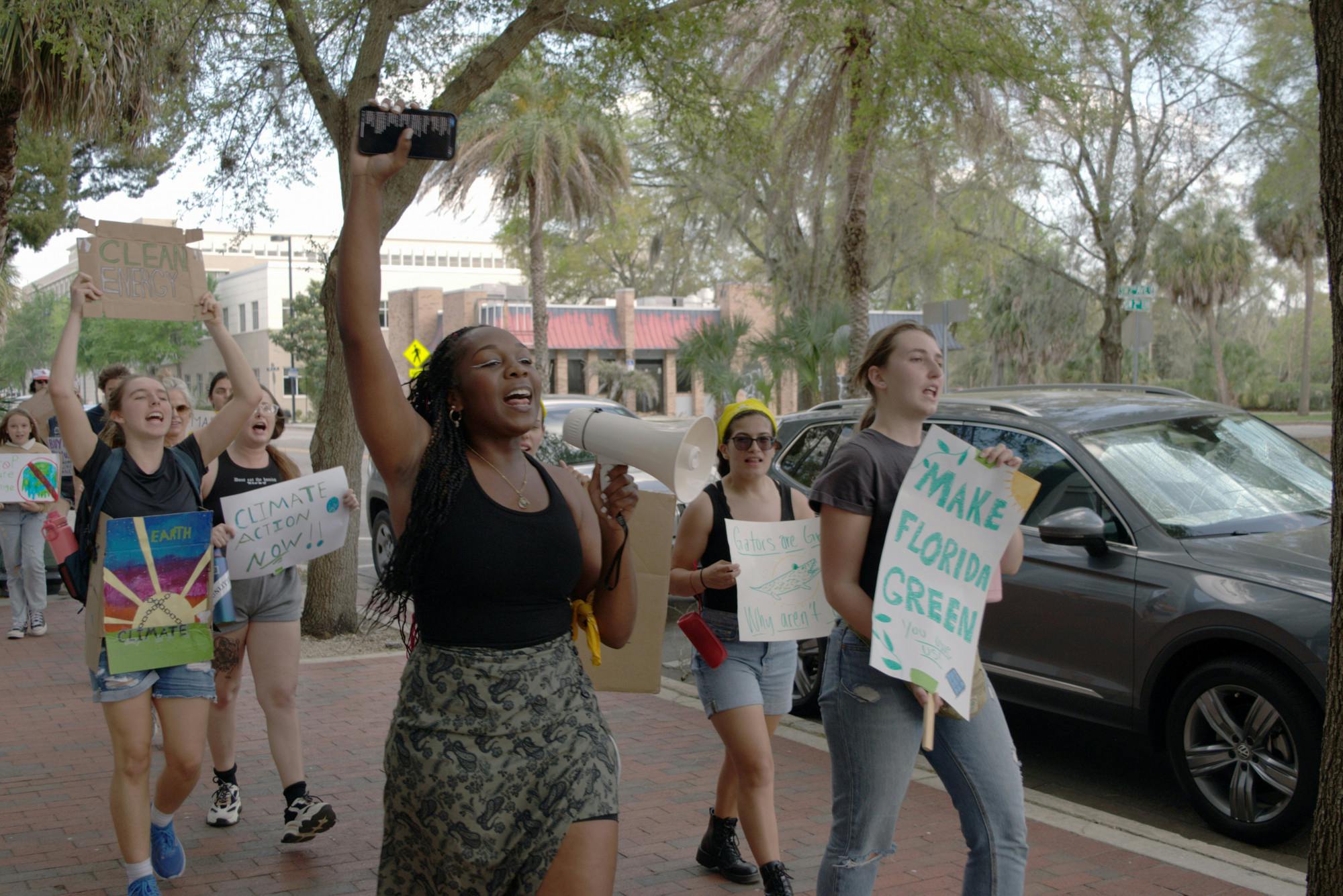
Sunrise Movement Gainesville, the local chapter of the national youth climate action movement, organized a march in downtown Gainesville to protest climate change March 3.
About 15 residents marched to bring attention to renewable energy and climate change impacts in Florida.
The protest also featured local leaders such as former U.S. congressional candidate Danielle Hawk and former City Commissioner David Arreola as keynote speakers. They spoke out about the impact legislation can have on climate climate change.
Contact Claire at cgrunewald@alligator.org. Follow her on Twitter @grunewaldclaire.

Claire Grunewald is a fourth-year journalism major and the Spring 2024 Editor In Chief of The Alligator. In her free time, she likes to go to concerts and attempt to meet her Goodreads reading goal.


